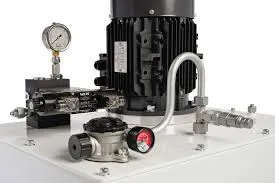Novemba . 29, 2024 21:38 Back to list
Energy Efficient Hydraulic Cylinder Solutions for Enhanced Performance and Sustainability
Energy-Efficient Hydraulic Cylinder Products A Revolution in Fluid Power
Hydraulic cylinders are vital components in a multitude of industrial applications, including construction machinery, manufacturing equipment, and automotive processes. These devices convert hydraulic energy into mechanical force, enabling movement and providing power to various systems. In the quest for sustainability and enhanced efficiency, the development of energy-efficient hydraulic cylinder products has emerged as a crucial focus within the hydraulic industry. This article explores the benefits, technologies, and future prospects of energy-efficient hydraulic cylinders.
Understanding Hydraulic Cylinders
At its core, a hydraulic cylinder consists of a cylindrical barrel, a piston, seals, and ports for fluid entry and exit. The hydraulic fluid exerts pressure on the piston, causing it to move and generate linear motion. Traditional hydraulic systems often suffer from inefficiencies due to energy losses in the form of heat, inadequate sealing, and leakage. As industries increasingly adopt energy conservation practices, the demand for energy-efficient hydraulic solutions has surged.
The Need for Energy Efficiency
The industrial sector is facing growing pressure to reduce energy consumption and emissions. Hydraulic systems, which traditionally involve significant energy expenditure, contribute substantially to operational costs and ecological footprints. By improving the energy efficiency of hydraulic cylinders, manufacturers can reduce operational costs, enhance performance, and minimize environmental impact. Energy-efficient hydraulic cylinders not only benefit the environment but also provide cost savings and improved reliability for end-users.
Innovations in Energy-Efficient Hydraulic Cylinders
Recent advancements in technology have led to the development of several innovative energy-efficient hydraulic cylinder products. Key innovations include
1. Advanced Sealing Technologies Improved sealing materials and designs can significantly reduce leakage and friction within hydraulic cylinders. This enhancement minimizes energy loss while boosting overall system efficiency.
2. Variable Displacement Pumps Traditional hydraulic systems often utilize fixed displacement pumps, leading to excess energy consumption. Variable displacement pumps adjust output to match demand, optimizing energy usage and reducing waste in hydraulic circuits.
3. Smart Control Systems The integration of smart control technologies enables real-time monitoring and adjustments to hydraulic systems. These systems can analyze performance data to optimize fluid flow and pressure, ensuring that energy is used only when necessary.
4. Alternative Fluids The use of bio-based or synthetic hydraulic fluids can improve performance and reduce environmental impact. New fluid formulations offer better lubrication properties, leading to lower friction and enhanced efficiency.
energy hydraulic cylinder products

5. Regenerative Systems Regenerative hydraulic systems capture and reuse energy from the system's motion. For example, energy generated during the retracting phase of a hydraulic cylinder can be stored and reused during the extension phase, greatly enhancing overall efficiency.
Benefits for Various Industries
Energy-efficient hydraulic cylinders stand to benefit a wide range of industries
- Construction Reducing fuel consumption in construction machinery can lead to significant cost savings and lower emissions. Energy-efficient cylinders contribute to more sustainable construction practices.
- Manufacturing In manufacturing, where precision and speed are critical, energy-efficient hydraulic systems help in reducing cycle times and improving product quality while saving on energy costs.
- Automotive Automotive manufacturers are increasingly adopting energy-efficient hydraulic systems in assembly operations, enhancing efficiency while meeting stringent environmental regulations.
The Future of Energy-Efficient Hydraulic Cylinders
As technologies continue to evolve, the future of energy-efficient hydraulic cylinder products looks promising. Ongoing research and development efforts aim to further enhance the efficiency and versatility of hydraulic systems. The adoption of Industry 4.0 practices, including automation and data analytics, will play a significant role in optimizing hydraulic operations and advancing energy-efficient solutions.
Moreover, as industries commit to sustainability goals, regulatory frameworks will increasingly favor energy-efficient technologies. Companies investing in energy-efficient hydraulic cylinders not only position themselves competitively but also contribute to a greener and more sustainable industrial landscape.
Conclusion
Energy-efficient hydraulic cylinder products represent a significant leap forward in the pursuit of sustainability and efficiency within the hydraulic industry. As innovations continue to emerge, the integration of advanced technologies will play a crucial role in shaping the future of hydraulic systems. By embracing energy-efficient solutions, industries can enhance performance, reduce costs, and minimize their environmental impact, paving the way for a brighter, more sustainable future.
-
1.5 Ton Lifting Cylinder 70/82-40-290-535 | Precision Engineering&Industrial Applications
NewsJul.21,2025
-
1.5 Ton Lifting Cylinder 70/82-40-290-535-Hebei Shenghan|Hydraulic Solution, Industrial Applications
NewsJul.21,2025
-
1.5 Ton Lifting Cylinder-Hebei Shenghan Hydraulic Machinery Co., Ltd.|High-Load Capacity&Industrial Hydraulic Solution
NewsJul.21,2025
-
1.5 Ton Lifting Cylinder-Hebei Shenghan Hydraulic Machinery Co., Ltd.|High-Load Capacity&Industrial Hydraulic Solution
NewsJul.21,2025
-
1.5 Ton Lifting Cylinder-Hebei Shenghan Hydraulic Machinery Co., Ltd.|High-Load Capacity&Industrial Hydraulic Solution
NewsJul.21,2025
-
1.5 Ton Lifting Cylinder 70/82-40-290-535 - Hebei Shenghan Hydraulic Machinery Co., Ltd. | High Performance, Durable, Industrial Use
NewsJul.21,2025
